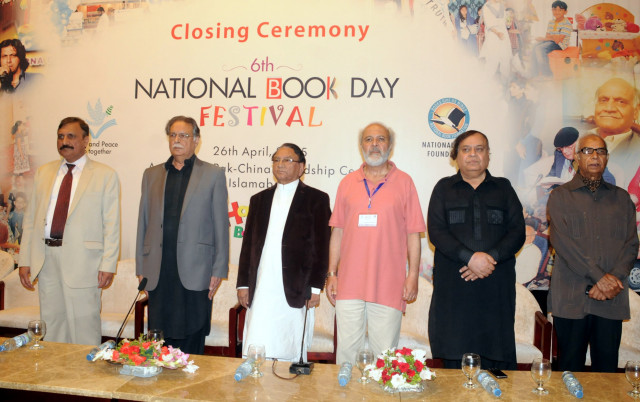Festival concludes on a sombre note
The three-day festival included book launches, discussions, poetry and theatre performances.

Closing ceremony of ILF attended by Information and Broadcasting Minister. PHOTO: EXPRESS
The third Islamabad Literature Festival (ILF) concluded on Sunday after breaking through the capital’s stony political demeanour with a festive bonanza of creative and literary activities, but the festivity was marred by rights activist Sabeen Mahmud’s murder.
The three-day festival included book launches, discussions, poetry and theatre performances.
From young ardent readers snapping photos with their favourite writers to jam-packed sessions, to discovering new trends in writing and publishing, the festival organised by the Oxford University Press (OUP) offered a celebration of books, authors and readers.
Despite a few glitches in the management, “and shortcomings,” as termed by Asif Farrukhi, the founder of the Karachi and Islamabad Literature Festival, with some revisions of speakers, the ILF managed to attract hundreds of literature enthusiasts from the twin cities and beyond.
The 2015 edition of the festival was bigger in some respects. It had over 174 speakers and almost twice the number of sessions than the previous year. The enthusiasm of participants was tantamount from the fact that during all these days, in the evening sessions there was no parking space.

The festival also housed political discussions on Afghanistan, Balochistan and media while some sessions took upon political tones even though they were meant to be literary.
Director Oxford University Press Ameena Saiyid started her closing speech by asking speakers to observe a minute’s silence. She said the whole idea behind holding this event is to pay homage to authors who play their role in the society’s development through their stories with different perspectives. “Fiction guides us to the alternative world as journalism is an approach of objectivity while fiction is subjective,” she said.
This year witnessed more speakers, participants from India than previous years which included Rahul Singh and Mala Dayal, son and daughter of the late Indian literary legend Khushwant Singh. “They visited Hadali, Khushab the birthplace of their father and were taken aback by the warmth and love they received from locals,” she remarked. The purpose of this event, she added, is to bring people closer for contribution of peace building and tolerance.
Talking about Sabeen, Farrukhi added that guns cannot replace books and the pen will always remain mightier and attendance of people in the festival to the brim is a reminder of it.
Poet Zehra Nigah remarked that unlike usual discussions of dresses, bags etc, the festival was full of people of all ages buying books, discussing literature. “This fills me with hope that soon we will have peace,” she said.
Paul Harding, winner of the Pulitzer Prize and keynote speaker also paid tribute to Sabeen saying since her death on April 24 he has been getting second hand know-how from people around him about the lady who was up to alleviate intellectual poverty. “It feels like losing a friend I have never met,” he said.
In the end a resolution was also shared written by author Shandana Minhas that called for taking forward the struggle against the voices that want to quell freedom of expression. The people should have choices beyond the exit and exile, read a resolution passed at the event.
Published in The Express Tribune, April 27th, 2015.



















COMMENTS
Comments are moderated and generally will be posted if they are on-topic and not abusive.
For more information, please see our Comments FAQ